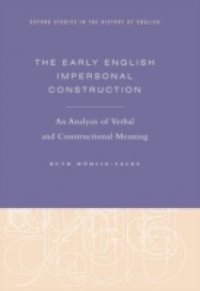The Early English Impersonal Construction aims to demonstrate that an understanding of the functional and semantic aspects of impersonal verbs in Old and Middle English can shed light on questions that remain about these verbs today. The impersonal construction has been a topic of extensive research for over a hundred years. But three quandaries-their seemingly unsystematic development, the gradual loss of impersonal uses, and the difficulty of aligning this with structural changes in early English-have made explanations for their development unsatisfactory. Mohlig-Falke offers a detailed analysis of impersonal verbs within the framework of cognitive and constructional grammar. She focuses on the loss of the impersonal construction as a consequence of a redefinition of the grammatical categories of subject and object, and describes the diachronic development of impersonal verbs as a result of the complex interaction of verbal and constructional meaning. Her research comprises all verbs which are recorded in impersonal use in Old and Middle English, and takes account of their full range of syntactic uses. It is thus the most comprehensive investigation of the impersonal construction in early English available to date.

